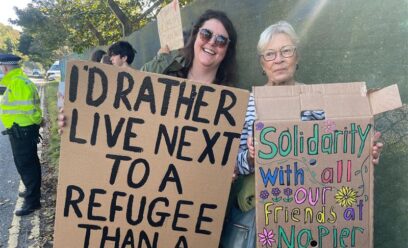Conversations in the Garden: using positive stories to address serious asylum issues
Posted by Siva Thangarajah on June 30, 2022Beekeeping and allotments: Conversations in the Garden show that positive stories can confront asylum issues in a direct, powerful way.

Ali Alzein, Founder of Bees and Refugees
For IMIX’s Refugee Week project, called Conversations in the Garden, we decided to highlight the many grassroots gardening and nature projects that support refugees.
We sent our team who are based all around the country – in Glasgow, North East England, Liverpool and London – to spend some time at their local community garden or farm.
What we found was how, despite the government’s efforts to roll back refugee rights, local communities are coming together to support displaced people.
We saw how local farms, gardens and allotments partner with refugee organisations so that displaced people can feel the benefits of community gardening – by creating a sense of community, improving language skills and mental wellbeing.
We also met people with lived experience who talk about how these projects support them where the government fails. Ali, Founder of Bees and Refugees uses beekeeping to combat prejudice towards refugees. We meet people like Valentin, who uses gardening to improve his English and learn more about Geordie culture in his adopted home of Newcastle.
Stories like theirs show that positive stories do not have to shy away from serious topics such as racism, prejudice, or deportations. Instead, highlighting voices of lived experience and grassroots projects show us exactly where the cracks in the system are.
1. Bees and Refugees: “It’s a hostile environment for bees and for refugees.”
Ali Alzein is the Founder of Bees and Refugees. After seeking refuge in the UK from Syria, he started beekeeping as a hobby to cope with his PTSD, inspired by his grandfather who kept bees as a hobby.
Now, he uses the power of beekeeping to help asylum seekers with their mental health and to provide them with an income by selling honey. Bees and Refugees helps improve cohesion between refugees and the public by partnering with local community gardens and farms so that the wider local community will also learn about bees…and refugees.
The video, for instance, was filmed in Oasis Farm, a community garden and farm.
2. WERS and Scotswood Community Gardens: “He’s always got lots of questions about our language and Geordie culture.”
Scotswood Garden is a thriving community garden with beehives, ponds and vegetable gardens in Newcastle who partner with local groups such as schools and older people’s groups.
Scotswood started a partnership with West End Refugee Service, who support displaced people in Tyneside.
Valentin is from Russia and found volunteering at Scotswood helped his language skills. “I met different people in this garden and I’m happy to talk with them, we try to be friendly, we talk about everything and especially some guys help me with my English.”
Sean Clay is Garden and Community Engagement Manager at Scotswood who is really proud of his volunteers.
“Valentin’s confidence and his language has hugely improved since coming to Scotswood – he’s always got lots of questions about our language and Geordie culture.”
3. Room To Heal: “You feel wanted and supported and cared for. It’s not just a garden.”
Room to Heal provide therapeutic spaces and care for those who have been forced to flee their home countries. Each week, members gather at Culpeper Community Garden to cook, garden and share a meal together.
Culpeper Garden is a community allotment and garden tucked away in the middle of Central London, away from the bustling city life.
We hear from Community Member Wasig enjoys working in the allotment and growing vegetables that he gets to cook into delicious meals for his fellow community members.
4. Stories and Supper
Stories and Supper is a social enterprise inWalthamstow, East London. Working with local volunteers and refugees of any status they aim to challenge the negative headlines about refugees, while bringing people together over delicious food.
They have an allotment where the team work together to grow food and spend time together in nature.
Founder Helen Taylor says: ‘We know how much watching things grow and having your hands in the soil can boost wellbeing and this is especially important for the refugees and asylum seekers we work with.’
5. Asylum Link Merseyside: “You see a positive change growing.”
Every week, gardeners from all the world come together at a local Liverpool allotment to enjoy the healing powers of nature.
Asylum Link Merseyside in Liverpool that supports local people who’ve sought safety there after fleeing violence or persecution in their home countries. They host events and activities supporting them settle into the community and help with their mental health.
Rasha Youssef, a refugee rights campaigner, visits their allotment to talk about how gardening helps them continue their lives.
6. The Hidden Gardens in Glasgow: “To meet a group of people who might be from the same background as them.”
Refugee Week Ambassador Aref Ghorbani visits The Hidden Gardens in Glasgow. Aref sought safety in the UK in 2018, and is a classically trained Iranian musician. You may have spotted him performing events in such as Edinburgh Fringe and COP26.
Aref is an advocate of utilising projects such as The Hidden Gardens as a way for displaced people to connect with others and get to know their local community.
But he is concerned that even with the support of grassroots organisations, moving on can be hard for displaced peoples when our government re-traumatises them.
‘When they reach out to a safe country such as the UK, this is not how they should be treated.’
If there is one thing we learnt from these conversations, is that we can discuss serious refugee and asylum issues through alternative lens and angles that grab people’s attention. After all, we can seek to influence breaking news stories, but especially for those who are not news junkies, positive stories are an important part of how we can keep telling stories of migration and displacement.



